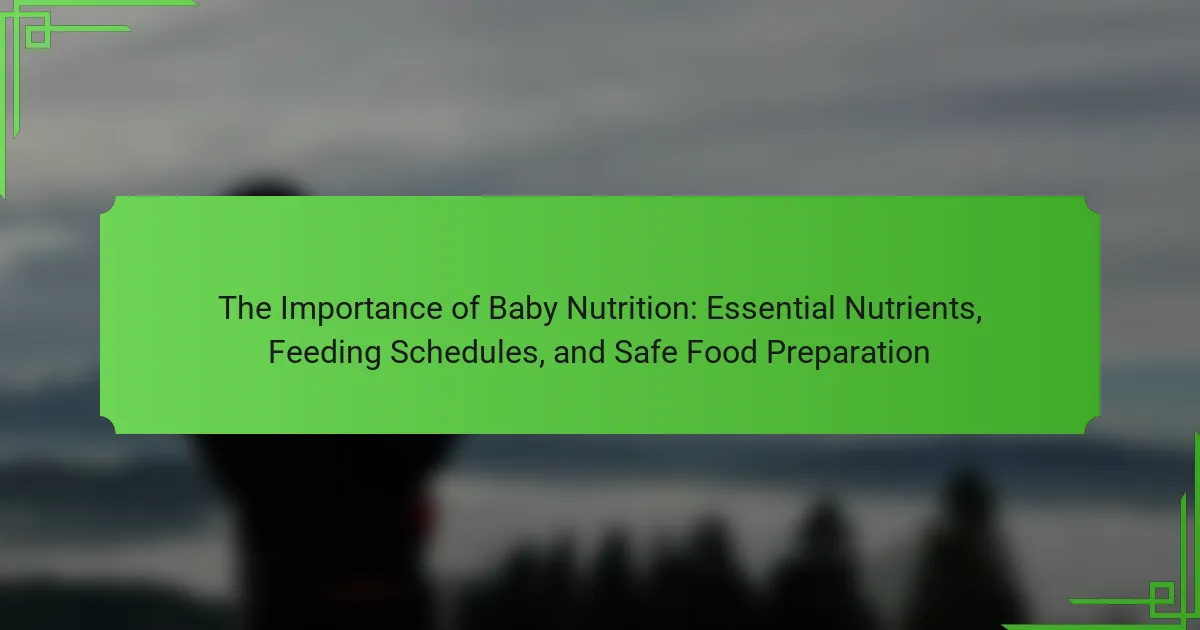Baby nutrition is essential for healthy growth and development during the first 1,000 days of life. This period requires specific nutrients, including proteins, fats, vitamins, and minerals, to support brain development, immune function, and physical growth. Recommended feeding schedules vary by age, starting with frequent feedings for newborns and transitioning to solid foods around 4 to 6 months. Safe food preparation practices, such as proper cooking temperatures and avoiding honey in the first year, are crucial to prevent health risks. Establishing consistent feeding routines and ensuring balanced nutrition can promote lifelong healthy eating habits.

Why is Baby Nutrition Important?
Baby nutrition is crucial for healthy growth and development. Proper nutrition supports brain development, immune function, and physical growth. Infants require specific nutrients such as proteins, fats, vitamins, and minerals. These nutrients help build strong bones, muscles, and tissues. According to the World Health Organization, adequate nutrition in the first 1,000 days of life is vital for lifelong health. Malnutrition during this period can lead to developmental delays and health issues. Ensuring balanced nutrition helps establish healthy eating habits that can last a lifetime.
What are the key nutrients essential for baby growth?
Key nutrients essential for baby growth include protein, carbohydrates, fats, vitamins, and minerals. Protein supports tissue development and muscle growth. Carbohydrates provide energy for daily activities and brain function. Healthy fats are crucial for brain development and hormone production. Vitamins, such as A, C, and D, play roles in immune function and bone health. Minerals like calcium and iron are vital for strong bones and blood formation. Adequate intake of these nutrients is necessary for optimal growth and development in infants.
How do proteins support a baby’s development?
Proteins support a baby’s development by providing essential amino acids necessary for growth. Amino acids are the building blocks of proteins and are crucial for tissue development. They facilitate the formation of muscles, organs, and enzymes in the baby’s body. Proteins also play a role in the immune system, helping to strengthen defenses against infections. According to the World Health Organization, adequate protein intake is vital during infancy for optimal growth and cognitive development. Infants require about 1.5 grams of protein per kilogram of body weight daily. This ensures proper brain development and overall health.
What role do fats play in brain development?
Fats are crucial for brain development. They provide essential fatty acids that support the formation of brain cell membranes. Omega-3 and omega-6 fatty acids are particularly important. These fats contribute to cognitive function and neural communication. During infancy, about 60% of the brain’s dry weight is fat. Adequate fat intake supports myelination, which enhances nerve signal transmission. Research indicates that infants with higher fat intake show improved cognitive outcomes. A study published in the American Journal of Clinical Nutrition highlights the link between fat consumption and brain development in early childhood.
Why are vitamins and minerals crucial for infants?
Vitamins and minerals are crucial for infants because they support growth, development, and overall health. Infants require essential nutrients for proper brain development, immune function, and bone health. For example, vitamin D is vital for calcium absorption, which is necessary for strong bones. Iron is important for cognitive development and preventing anemia. Additionally, vitamins A and C support vision and immune health, respectively. Research shows that deficiencies in these nutrients can lead to serious developmental issues. A balanced diet ensures infants receive the necessary vitamins and minerals for optimal health.
How does baby nutrition impact long-term health?
Baby nutrition significantly impacts long-term health by influencing growth, development, and disease risk. Proper nutrition in infancy supports brain development, immune function, and healthy weight. For example, infants receiving adequate essential fatty acids show improved cognitive outcomes. Research indicates that poor nutrition during this critical period can lead to obesity, diabetes, and cardiovascular diseases later in life. A study published in “The American Journal of Clinical Nutrition” found that infants with balanced diets had a lower incidence of chronic diseases as adults. Therefore, ensuring optimal nutrition in early life is crucial for promoting lifelong health.
What are the consequences of poor nutrition in infancy?
Poor nutrition in infancy can lead to significant health consequences. Infants may experience stunted growth and development. This can result in long-term physical and cognitive impairments. Malnutrition during this critical period affects brain development. It can also lead to weakened immune function. Infants may become more susceptible to infections. Additionally, poor nutrition can result in nutritional deficiencies, such as iron-deficiency anemia. These deficiencies can affect overall health and well-being. Studies show that malnourished infants are at a higher risk for chronic diseases later in life.
How can proper nutrition prevent future health issues?
Proper nutrition can prevent future health issues by providing essential nutrients that support growth and development. Adequate intake of vitamins and minerals strengthens the immune system. For instance, vitamin C enhances immune function and reduces the risk of infections. Balanced nutrition also supports healthy weight management, which lowers the risk of obesity-related diseases. Research shows that children with proper nutrition are less likely to develop chronic conditions later in life. A study published in the “American Journal of Clinical Nutrition” indicates that early nutritional interventions can reduce the incidence of type 2 diabetes. Additionally, a diet rich in whole foods promotes better cognitive function, which is crucial for learning and development. Overall, proper nutrition lays the foundation for long-term health and well-being.

What are the Recommended Feeding Schedules for Babies?
Recommended feeding schedules for babies vary by age. Newborns typically feed every 2 to 3 hours. This frequency supports their rapid growth and development. At around 4 to 6 months, babies may start to consume solid foods. Parents can introduce solids while continuing breast milk or formula. By 6 to 12 months, feeding can occur 3 to 4 times daily. Snacks can also be included as needed. After 12 months, a more regular meal schedule is advisable. This usually includes 3 meals and 2 snacks per day. Consistency in feeding times helps establish routines.
How often should babies be fed in the first year?
Babies should be fed every 2 to 3 hours in the first year. Newborns typically require about 8 to 12 feedings per day. This frequency supports their rapid growth and development. As babies grow, the feeding schedule may change. By 6 months, many infants can start solid foods while still receiving breast milk or formula. Feeding frequency may reduce to 4 to 6 times a day as they consume more solids. Consistent feeding helps ensure adequate nutrient intake. Pediatric guidelines recommend monitoring baby’s hunger cues for optimal feeding times.
What is the feeding schedule for newborns?
Newborns typically feed every 2 to 3 hours. This schedule ensures they receive adequate nutrition for growth. During the first few weeks, they may consume about 1.5 to 3 ounces per feeding. As they grow, the volume may increase. Feeding on demand is also common, responding to the baby’s hunger cues. Breastfeeding or formula feeding is recommended during this period. According to the American Academy of Pediatrics, newborns should be fed frequently to support their rapid development.
How does the feeding frequency change as babies grow?
As babies grow, their feeding frequency decreases. Newborns typically require feeding every 2 to 3 hours. This frequency supports their rapid growth and high caloric needs. By around 4 to 6 months, many babies can go 4 to 6 hours between feedings. At this stage, they may also begin to eat solid foods. By the time they reach one year, most babies can eat 3 meals a day with snacks in between. This gradual reduction in feeding frequency aligns with their developing digestive systems and nutritional needs.
What signs indicate a baby is ready for solid foods?
A baby is ready for solid foods when they can sit up with support and have good head and neck control. They may also show interest in food by reaching for it or watching others eat. Additionally, the baby should have lost the tongue-thrust reflex, allowing them to move food to the back of their mouth. They should be able to open their mouth when food approaches. These signs typically appear around six months of age, according to pediatric guidelines.
How can parents identify readiness for solids?
Parents can identify readiness for solids when their baby shows specific developmental signs. These signs include the ability to sit up with minimal support. Babies should also demonstrate good head and neck control. They may show interest in food by reaching for it or watching others eat. Another indicator is the ability to move food to the back of the mouth and swallow it. The American Academy of Pediatrics recommends starting solids around six months of age, aligning with these readiness signs. Observing these cues helps ensure a safe and appropriate introduction to solid foods.
What are the best first foods for babies?
The best first foods for babies include iron-fortified cereals, pureed fruits, and pureed vegetables. Iron-fortified cereals provide essential iron for growth and development. Pureed fruits such as bananas and apples are easy to digest and rich in vitamins. Pureed vegetables like sweet potatoes and carrots offer important nutrients and flavors. These foods are recommended by pediatricians for introducing solids around six months of age. They help babies develop taste preferences and ensure adequate nutrition.

What are the Best Practices for Safe Food Preparation for Babies?
Wash hands thoroughly before preparing food for babies. Clean surfaces and utensils to prevent contamination. Use fresh ingredients to ensure safety. Cook foods to appropriate temperatures to kill harmful bacteria. Avoid honey in the first year due to botulism risk. Cut food into small, manageable pieces to prevent choking. Store leftovers promptly and at safe temperatures. Regularly check expiration dates on baby food products.
How can parents ensure food safety for their babies?
Parents can ensure food safety for their babies by following strict hygiene practices. They should wash their hands before preparing food. Clean all surfaces and utensils used for food preparation. Parents must ensure that food is cooked to safe temperatures. For example, poultry should reach 165°F to kill harmful bacteria. They should also store food at appropriate temperatures, keeping perishable items refrigerated. Additionally, parents should check expiration dates on baby food products. They must avoid giving honey to babies under one year, as it can cause botulism. Following these guidelines can significantly reduce the risk of foodborne illnesses in infants.
What are the key hygiene practices during food preparation?
Key hygiene practices during food preparation include washing hands, cleaning surfaces, and separating raw and cooked foods. Washing hands with soap and water for at least 20 seconds reduces the risk of contamination. Cleaning surfaces with hot soapy water or sanitizers prevents the spread of bacteria. Using separate cutting boards for raw meats and vegetables minimizes cross-contamination. Cooking foods to the right temperature kills harmful pathogens. Storing foods at safe temperatures slows bacterial growth. Regularly checking expiration dates ensures food safety. Following these practices helps maintain a safe food preparation environment.
How should baby food be stored and handled?
Baby food should be stored in a cool, dry place. After opening, it must be refrigerated immediately. Use airtight containers to keep the food fresh. Consume refrigerated baby food within 48 hours. Frozen baby food can last for up to three months. Always check for signs of spoilage before feeding. Discard any food with an unusual odor or appearance. Proper handling reduces the risk of foodborne illness.
What techniques can be used for introducing new foods?
Techniques for introducing new foods include gradual exposure, mixing with familiar foods, and positive reinforcement. Gradual exposure involves offering small amounts of the new food alongside familiar favorites. Mixing new foods with those already accepted can enhance acceptance. Positive reinforcement encourages babies to try new foods by praising them for tasting. Research indicates that repeated exposure increases acceptance rates of new foods in children. A study published in the journal Appetite found that children who were repeatedly exposed to a variety of foods accepted them more readily.
How can parents manage food allergies and sensitivities?
Parents can manage food allergies and sensitivities by identifying trigger foods and avoiding them. Keeping a detailed food diary helps track reactions to specific foods. Consulting with a healthcare professional is essential for accurate diagnosis and management plans. Educating family members about the allergies ensures a supportive environment. Reading food labels is crucial to avoid hidden allergens. Creating a safe eating space minimizes the risk of cross-contamination. Regular check-ins with a nutritionist can provide updated dietary strategies. According to the American Academy of Pediatrics, early introduction of allergenic foods may reduce the risk of developing allergies.
What are the best methods for preparing homemade baby food?
The best methods for preparing homemade baby food include steaming, pureeing, and baking. Steaming retains nutrients and softens vegetables and fruits. Pureeing involves blending cooked ingredients to a smooth consistency. Baking can enhance flavor and soften food, particularly for fruits.
Using fresh, organic ingredients is recommended to avoid additives. Proper food storage is crucial; baby food should be refrigerated and used within a few days. Freezing portions can extend shelf life. Always introduce new foods gradually to monitor for allergies. These methods ensure the food is nutritious and safe for babies.
What tips can help parents navigate baby nutrition effectively?
Parents can effectively navigate baby nutrition by introducing a variety of foods. This includes fruits, vegetables, grains, and proteins. Start with single-ingredient purees to monitor for allergies. Gradually introduce new foods every few days. Ensure foods are appropriately textured for the baby’s age. Follow guidelines for age-appropriate feeding schedules. Breast milk or formula should remain the primary source of nutrition until one year. Always consult with a pediatrician for personalized advice. Research shows that diverse diets can promote healthy eating habits later in life.
The main entity of the article is baby nutrition, which is essential for healthy growth and development in infants. The article outlines the importance of specific nutrients such as proteins, fats, vitamins, and minerals that support brain development, immune function, and physical growth. It discusses recommended feeding schedules for babies, signs of readiness for solid foods, and best practices for safe food preparation. Additionally, the article emphasizes the long-term health impacts of proper nutrition during infancy and provides guidance for parents on managing food allergies and preparing homemade baby food.
